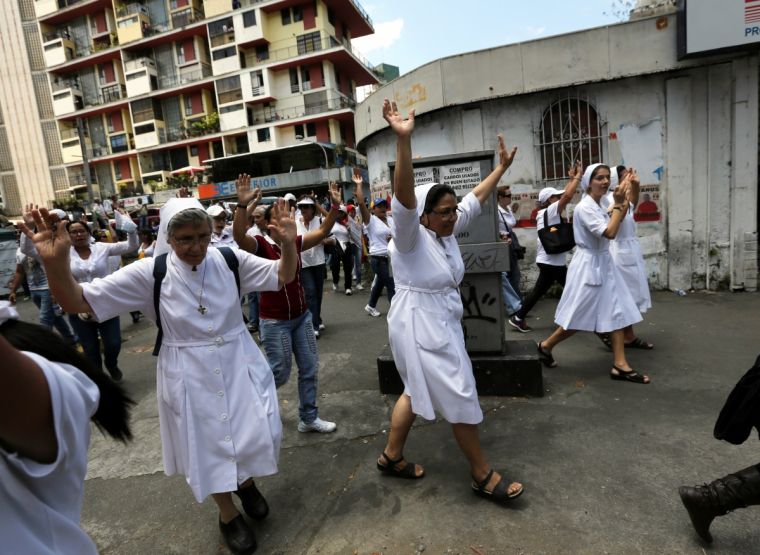Chaos in Caracas - One church worker's story

Despite pleas from Pope Francis and senior Catholics from across Venezuela, protests against the government of Nicolás Maduro continue to run their course across the capital Caracas.
They were sparked by the killing of a student at one of the universities on National Youth Day, on 12 February but have since evolved into a national protest.
The students had been protesting a lack of security and safety at their campuses, as well as the general lack of safety in Venezuelan society.
This was highlighted prominently first by the death on 6 January of Monica Spear, a former Miss Venezuela, who was killed in a roadside robbery while her 5-year-old daughter was still in the car.
This was followed in early February by the attempted rape of a student at a university campus in the city of San Cristobal. When protests came in response to this, the government engaged heavyhanded tactics but its response was miscalculated.
Clarence Welds of the Lighthouse Church, Caracas, described the moment he knew it wasn't a simple protest and that something more serious was happening.
"It started with just protests on the street, the normal thing, just a few students," he said.
"A few of my colleagues from my work joined them. Nothing really serious from what I could see.
"But then on a particular night, 12 February, the street was completely blocked, no one could get past.
"People were marching, holding up banners, placards, shouting, many were just standing and watching.
"And as I walked up the street my eyes began to run with water, and I was wondering why, and I realised it was because of tear gas.
"That's when I knew that something serious was going on.
"About an hour after I left that place, someone had died. Right there, at that exact place where I had been, they had been shot."
The turbulence has rumbled on.
"Since that day, it has been every day. Coming home from work I see concrete blocks lining the roads. There are tyres on the street, piles of burning trash on the street," he says.
The protests may be on the street but they have impacted people's lives and the church has not entirely escaped the upheaval.
Lighthouse has been forced to cancel its midweek evening services because it is not safe to be out in the evenings.
"The area where our church meets, we've had blockages on the road. Protesters block the road with trash, and then they start to burn the trash," he explains.
To the outside world, the protests may appear to have sprung up from nowhere, but Mr Welds says the frustrations that underpin them have been "building up for years".
"It is nothing new. The people just feel that the government is incapable of solving the very basic problems."
Problems like a shortage of basic items and food in the shops.
"You have to queue for an hour to buy toilet paper, soap, oil, all the basic general things," he says.
These issues have largely been caused by the Venezuelan government's aggressively socialist management of the economy, with runaway inflation leading to strict price controls.
The government has tried to combat this with currency devaluations, but without tackling the underlying causes of the inflation, things have only gotten worse.
Empresas Polar, a Venezuelan food manufacturer and a company heavily impacted by price controls, is owed $463m by the government. It is now in danger of being unable to pay foreign suppliers, potentially halting production.
There is now so little money in the country that the government is having difficulty importing such basic goods as paper.
These problems, coupled with the rising protests, are making some people want to leave.
"People are trying to run out of the country," says Mr Welds.
"I've been trying to book a ticket for the last week, but there are no tickets because of the government owing money to the plane companies."
Amidst the scarcity and the anger, Pope Francis has called for calm. He was quoted by Catholic World News saying: "I sincerely hope that violence and hostility will cease as soon as possible."
He spoke of his desire to see "that the whole Venezuelan people, beginning with political leaders and institutions, will endeavour to promote reconciliation through mutual forgiveness and a sincere dialogue, respectful of truth and justice, that is capable of dealing with concrete issues for the common good".
Caracas Auxiliary Bishop Jesus Gonzalez de Zarate, secretary-general of the Venezuelan bishops' conference, appealed to social and political leaders to engage in "deep, sincere dialogue".
When asked if the situation looked to be improving from his perspective, Mr Welds was doubtful. The protesters have plenty of support, he explains.
"Sixty per cent of the country is not that excited by the government.
"The government at the moment is not viewed with much respect. They see that the only solution is for him to step down as president, and they want him to do that as soon as possible."
"Yesterday there was a big meeting with leaders of the big companies, community leaders, district leaders, other faiths. But many opposition leaders boycotted it, and so no one took it seriously.
"Unless the Government become really honest, and they say something like 'this and this and this is the problem, and here's what we're going to do to get it solved' I don't see things getting better in the future."
Nevertheless, Mr Welds does not forget his role as a leader of a church: "I'm just trying to be the light, trying to get people to be focused on the kingdom of God, not to be quite so moved by the political situation."











